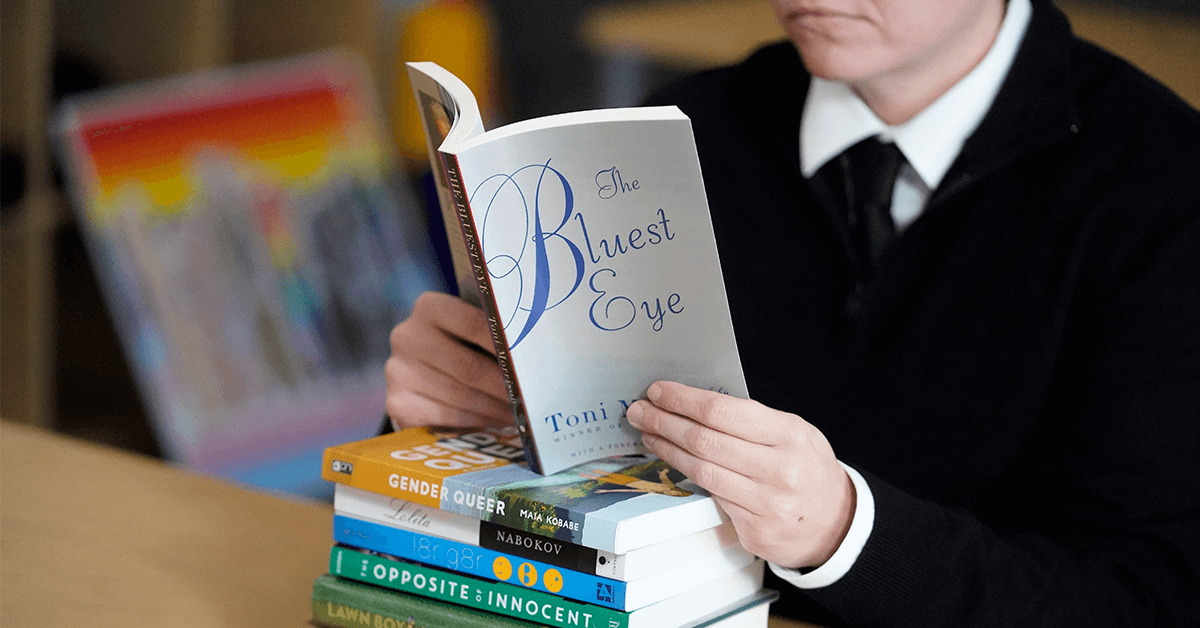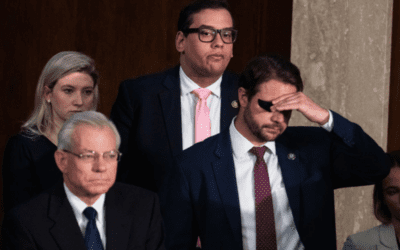
AP Photo/Rick Bowmer, File
There are currently four Republican-backed bills that would limit what books could be used in schools making their way through the Arizona legislature.
Three in four Arizonans oppose politicians banning books in schools and believe it’s un-American to do so, according to a new Courier Newsroom/Data for Progress survey.
Seventy-five percent of Arizona voters agree that “state lawmakers banning books at schools is a form of censorship and goes against American values of freedom of speech and expression,” according to the survey. Seventy-six percent said they strongly or somewhat opposed lawmakers banning books in schools, while only 24% support such bans.
Unpopular in Arizona and Nationwide
The results are in line with other polls highlighting the deep unpopularity of the Republican-led book ban movement.
Over the past 18 months, conservative activists, media, and politicians have stoked panic among some parents that public school children are being taught “Critical Race Theory” (CRT), an academic legal framework that studies the impact of systemic racism in the United States at the graduate school level.
CRT is not taught in K-12 schools, but that hasn’t stopped Republican leaders in state legislatures and school boards from rushing to ban books, censor how educators can teach about race and American history, and push curriculum transparency bills that critics believe are intended to instill fear in teachers.
Several Book-Banning Bills in Play
In Arizona, the Republican-led state House spent much of the last month passing bills limiting what students can learn.
In early February, they passed HB 2495 from State Rep. Jake Hoffman, a bill that would make it illegal for schools to include any “sexually explicit material” in their curriculums—defined as textual, video, or audio material that depict sexual conduct, such as masturbation, sexual intercourse, or “sexual excitement.”
Schools can only use such material if it is a piece of classical literature, early American literature, or is a required book for a course to receive college credit–but only if they also get parental consent.
An earlier version of the bill also banned material that includes any acts of homosexuality, but that measure was removed from the final version.
The state House also passed Rep. Beverly Pingerelli’s HB 2439, which would allow parents to review books for school libraries by requiring school district governing boards to make available all books being considered for libraries for public review for at least 60 days. Under the bill, parents must be notified of the public review periods and books being considered seven days before the public review period begins.
Backflash From Parents and Educators
The bill has drawn backlash from teachers and parents who’ve argued it represents censorship and an effort to push certain ideologies on children. Another bill that cleared the House, HB 2112, does not explicitly target CRT, but would limit how educators can talk about racism, by banning teachers from any instruction that “promotes or advocates for any form of blame or judgment based on race, ethnicity or sex.”
Critics of the bill, including Arizona Republic columnist E.J. Montini, have noted that it’s vague wording could lead to teachers being punished for pointing out that men prevented women from being able to vote before the 19th Amendment was passed in 1919.
If the bill becomes law, teachers could potentially lose their teaching licenses if they are found to have run afoul of its prohibitions. School districts could also face fines of up to $5,000 for each violation.
House Republicans also approved a resolution called the “Stop Critical Race Theory and Racial Discrimination in Schools and Other Public Institutions Act.” The resolution, which seeks to amend the state constitution, states that CRT contradicts the Fourteenth Amendment, the Civil Rights Act of 1964, and the Arizona Constitution because it divides people based on race and ethnicity.
All four bills are currently being considered by the state Senate, even as polling suggests censorship and book bans are widely unpopular.
Survey Methodology: Data for Progress estimates opinion at the state level using a machine learning model trained on nationally representative survey responses linked to a commercial voter file. The model accounts for over 400 variables, including individual demographic characteristics, vote history, and primary participation as well as the political and demographic characteristics of the respondents’ census tract.
Looking for the latest Arizona news? Sign up for our FREE daily newsletter.

He said what? 10 things to know about RFK Jr.
The Kennedy family has long been considered “Democratic royalty.” But Robert F. Kennedy, Jr.—son of Robert F. Kennedy, who was assassinated while...

Here’s everything you need to know about this month’s Mercury retrograde
Does everything in your life feel a little more chaotic than usual? Or do you feel like misunderstandings are cropping up more frequently than they...

Arizona expects to be back at the center of election attacks. Its officials are going on offense
Republican Richer and Democrat Fontes are taking more aggressive steps than ever to rebuild trust with voters, knock down disinformation, and...

George Santos’ former treasurer running attack ads in Arizona with Dem-sounding PAC name
An unregistered, Republican-run political action committee from Texas with a deceptively Democratic name and ties to disgraced US Rep. George Santos...




